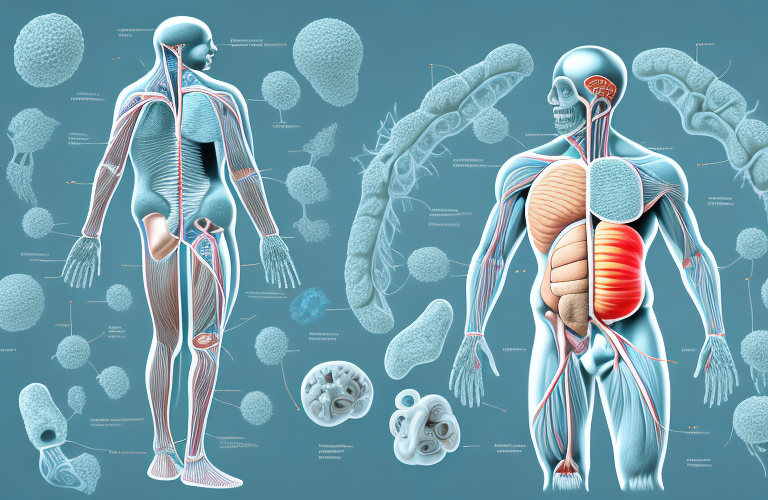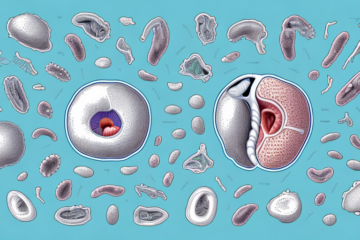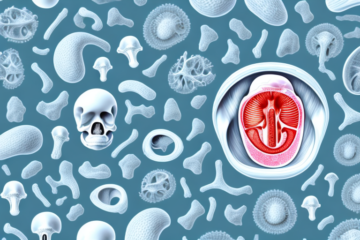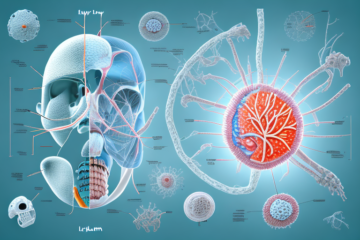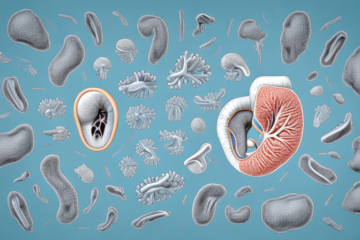The adrenal glands are small, triangular-shaped glands located on top of each kidney. These glands play a crucial role in the endocrine system, producing hormones that regulate various bodily functions. In this article, we will delve deeper into the anatomy and function of these glands, as well as highlight common disorders associated with them and natural ways to support their health.
The Anatomy of Adrenal Glands
The adrenal glands are composed of two main parts: the adrenal cortex and the adrenal medulla. The cortex is the outer layer and secretes hormones that are steroid-based, including cortisol, aldosterone, and androgens. The medulla, located in the center of the gland, produces catecholamines, such as adrenaline and noradrenaline.
The adrenal glands are located on top of each kidney and are responsible for producing hormones that regulate various bodily functions, including metabolism, blood pressure, and the body’s response to stress. The adrenal cortex is further divided into three layers, each producing different hormones. The zona glomerulosa produces aldosterone, which regulates salt and water balance in the body. The zona fasciculata produces cortisol, which helps the body respond to stress and regulates metabolism. The zona reticularis produces androgens, which are male sex hormones that also play a role in female health. Dysfunction of the adrenal glands can lead to various health problems, including Addison’s disease and Cushing’s syndrome.
The Role of Adrenal Glands in the Endocrine System
The endocrine system is a network of glands that produce and secrete hormones throughout the body. The adrenal glands are an integral part of this system, producing hormones that help regulate blood sugar levels, blood pressure, and metabolism. They also play a key role in the body’s response to stress, producing cortisol and adrenaline in response to perceived threats.
Additionally, the adrenal glands are responsible for producing small amounts of sex hormones, such as testosterone and estrogen. These hormones play a role in the development of secondary sex characteristics and the regulation of the reproductive system. Dysfunction of the adrenal glands can lead to a variety of health issues, including Addison’s disease and Cushing’s syndrome.
Understanding the Function of Adrenal Glands
The adrenal glands produce several hormones that play different roles in the body. Cortisol, for example, helps regulate glucose metabolism and the immune system’s response to inflammation. Aldosterone helps regulate electrolyte levels and blood pressure, while androgens are responsible for the development of male sex characteristics.
In addition to these hormones, the adrenal glands also produce adrenaline, also known as epinephrine. Adrenaline is released in response to stress or danger, and it increases heart rate, blood pressure, and respiration, preparing the body for a fight or flight response. Adrenaline also causes the liver to release glucose into the bloodstream, providing the body with a quick source of energy. However, prolonged exposure to high levels of adrenaline can have negative effects on the body, such as increased risk of heart disease and high blood pressure.
Cortisol and Its Importance in Our Body
Cortisol is a hormone produced by the adrenal cortex that helps regulate various bodily functions, including metabolism, blood pressure, and immune function. It also plays a crucial role in the body’s response to stress, helping to increase blood sugar levels and prepare the body for a perceived threat. However, chronic stress can lead to elevated cortisol levels, which can have negative effects on the body, such as weight gain, high blood pressure, and impaired immune function.
Research has also shown that cortisol levels can be affected by sleep patterns. Lack of sleep or poor quality sleep can lead to increased cortisol levels, which can contribute to a range of health problems. On the other hand, getting enough sleep and practicing good sleep hygiene can help regulate cortisol levels and promote overall health.
In addition to its role in stress response, cortisol also plays a part in the body’s circadian rhythm. Cortisol levels naturally fluctuate throughout the day, with the highest levels in the morning and the lowest at night. Disruptions to this natural rhythm, such as shift work or jet lag, can lead to imbalances in cortisol levels and have negative effects on health and well-being.
The Effects of Adrenaline on Our Body
Adrenaline, also known as epinephrine, is a hormone produced by the adrenal medulla that helps prepare the body for a perceived threat. It increases heart rate, blood pressure, and breathing rate, while also dilating the airways and increasing blood flow to the muscles. These physiological changes help the body respond to a perceived danger, allowing for increased strength and speed.
However, prolonged exposure to adrenaline can have negative effects on the body. It can lead to increased anxiety, insomnia, and even heart disease. Additionally, the constant activation of the body’s stress response can weaken the immune system, making individuals more susceptible to illnesses. Therefore, while adrenaline can be beneficial in short bursts, it is important to manage stress levels and find healthy ways to cope with perceived threats in order to maintain overall health and well-being.
How Stress Affects Our Adrenal Glands
Stress can have a significant impact on the function of our adrenal glands. Chronic stress can lead to elevated cortisol levels, which can have negative effects, such as weight gain, high blood pressure, and impaired immune function. In addition, prolonged stress can result in adrenal fatigue, a condition in which the adrenal glands become exhausted and unable to produce adequate levels of cortisol.
It is important to note that not all stress is bad for our adrenal glands. Short-term stress, such as the stress we experience during exercise, can actually be beneficial for our adrenal glands. This type of stress can help to strengthen the adrenal glands and improve their function.
There are also several natural remedies that can help to support the health of our adrenal glands. These include getting enough sleep, reducing caffeine and sugar intake, practicing stress-reducing techniques such as meditation and yoga, and taking supplements such as vitamin C and B vitamins.
Common Disorders Associated with Adrenal Glands
There are several disorders associated with the adrenal glands, including Addison’s disease, Cushing’s syndrome, and adrenal tumors. Addison’s disease is a rare condition in which the adrenal glands do not produce enough hormones, while Cushing’s syndrome is a condition characterized by elevated cortisol levels. Adrenal tumors can also affect adrenal gland function, leading to the overproduction of hormones.
Another common disorder associated with the adrenal glands is pheochromocytoma, which is a rare tumor that develops in the adrenal medulla. This tumor can cause the adrenal glands to produce too much adrenaline and noradrenaline, leading to symptoms such as high blood pressure, rapid heartbeat, and sweating.
In addition to these disorders, adrenal insufficiency can also occur as a result of long-term use of corticosteroid medications. This can lead to a range of symptoms, including fatigue, weakness, and weight loss. It is important for individuals who are taking corticosteroids to be monitored closely by their healthcare provider to prevent adrenal insufficiency from developing.
Diagnosis and Treatment for Adrenal Gland Disorders
If you suspect you have an adrenal gland disorder, it’s important to seek medical attention. Your doctor will likely recommend several tests, including blood tests, imaging tests, and hormonal stimulation tests, to diagnose any issues. Treatment for adrenal gland disorders varies depending on the specific condition but may include medications, surgery, or lifestyle changes.
Some common adrenal gland disorders include Addison’s disease, Cushing’s syndrome, and pheochromocytoma. Addison’s disease occurs when the adrenal glands don’t produce enough hormones, while Cushing’s syndrome occurs when the glands produce too much cortisol. Pheochromocytoma is a rare tumor that can cause excessive production of adrenaline and noradrenaline. It’s important to work closely with your doctor to determine the best course of treatment for your specific condition.
Natural Ways to Support Your Adrenal Health
There are several natural ways to support adrenal health, including reducing stress, getting adequate sleep, and exercising regularly. Eating a balanced diet, rich in whole foods and nutrients that support adrenal function, can also be beneficial.
Another way to support adrenal health is by incorporating adaptogenic herbs into your diet. Adaptogens are a class of herbs that help the body adapt to stress and promote balance. Some popular adaptogenic herbs include ashwagandha, rhodiola, and holy basil.
In addition, it’s important to limit your intake of caffeine and sugar, as these can put additional stress on the adrenal glands. Instead, opt for herbal teas or water to stay hydrated and energized throughout the day.
Lifestyle Changes to Improve Adrenal Function
In addition to natural remedies, making lifestyle changes can also help improve adrenal function. Prioritizing self-care, avoiding unnecessary stressors, and practicing relaxation techniques, such as yoga and meditation, can all be helpful in supporting adrenal health.
Another important lifestyle change to improve adrenal function is getting enough sleep. Adequate sleep is crucial for the body to repair and regenerate, and lack of sleep can put additional stress on the adrenal glands. It is recommended to aim for 7-9 hours of sleep per night to support adrenal health.
Foods that Boost Adrenal Health
Certain foods can also be beneficial for supporting adrenal health. These include grass-fed beef, fatty fish, nuts and seeds, and whole grains. Foods rich in vitamin C, such as citrus fruits and dark leafy greens, can also support adrenal health by reducing inflammation and supporting immune function.
In addition to these foods, incorporating probiotics into your diet can also support adrenal health. Probiotics help to maintain a healthy gut microbiome, which is important for overall health and can also impact adrenal function. Foods such as yogurt, kefir, and fermented vegetables are good sources of probiotics.
It is also important to avoid certain foods that can negatively impact adrenal health. These include processed foods, caffeine, and sugar. These foods can cause inflammation and stress on the body, which can lead to adrenal fatigue and other health issues.
Supplements that Can Help Support Your Adrenals
If you’re looking to boost your adrenal health, several supplements may be helpful, including magnesium, which can help reduce stress and anxiety, and adaptogenic herbs, such as ashwagandha and licorice root, which can help support adrenal function. However, it’s important to consult with a healthcare professional before beginning any supplement regimen.
In addition to supplements, there are several lifestyle changes that can also support adrenal health. Getting enough sleep, reducing stress, and engaging in regular exercise can all help to regulate cortisol levels and support overall adrenal function.
It’s also important to pay attention to your diet when it comes to adrenal health. Eating a balanced diet that includes plenty of fruits, vegetables, and whole grains can provide the nutrients your body needs to support adrenal function. Additionally, avoiding processed foods and limiting caffeine and alcohol intake can also be beneficial.
Tips for Managing Stress and Supporting Your Adrenal Glands
Finally, managing stress is an essential part of supporting adrenal health. Prioritizing self-care, practicing relaxation techniques, and seeking guidance from a mental health professional can all be helpful in reducing stress and supporting adrenal function.
In conclusion, the adrenal glands play a crucial role in regulating various bodily functions. Understanding their function and taking steps to support their health can have a significant impact on overall well-being. By making lifestyle changes, incorporating natural remedies, and seeking medical attention when necessary, you can support your adrenal glands and optimize your health.
It is important to note that chronic stress can lead to adrenal fatigue, a condition where the adrenal glands are unable to produce enough hormones to meet the body’s needs. Symptoms of adrenal fatigue include fatigue, difficulty sleeping, and difficulty handling stress. If you suspect you may be experiencing adrenal fatigue, it is important to speak with a healthcare professional to determine the best course of treatment.

